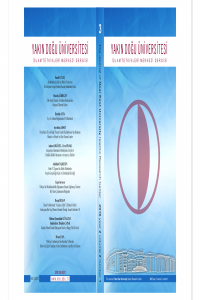İslam Felsefesinde “Vucud-u Zihnî” (Zihinsel Varlık) Anlayışına Bir Geç Dönem Osmanlı Örneği: İsmail Gelenbevî II
Abstract
Bilginin mahiyeti ve menşei ve doğruluk problemleri felsefenin
ebedi problemleridir. İslam epistemolojisi algılayan özne, algılanan
nesne ve alelıtlak algı arasındaki üçlü ilişkiyle ilgilenmiştir. Ancak
bu konuları açıklarken bilgiyi gerçekliğin bilenin ruhunda kalan
sureti olarak sunmaları töz ve araz kategorilerinde bir takım karışıklıklara
sebep olmuş, bu yüzden farklı teoriler ortaya çıkmıştır.
Buna göre bilgi izafettir; veya suretin irtisamıdır; veya bilinen
nesnenin mahiyetinin ruhta yerleşmesidir. İslam dünyasında bu
konuyla ilgilenilmiş ve bu konuyla ilgilenen düşünürler birbirini
takip etmiştir. Fârâbî, İbn Sînâ, Sühreverdi, F. Razi, Nasır
Tusi, Recep Ali Tebrizi gibi.
Keywords
References
- Metin altındadır...
Abstract
The nature and origin of knowledge, and the problem of truth
are of perennial problems of philosophy. In Islamic philosophy
the epistemologic inquiry primarily concerns perception and the
threeway relationship between the percept , the perceived object,
and perception. The Meşşai (Peripatetic) account of knowledge as
the “illustration” of the reality of the perceived object in the soul,
or the presence of its essence in the soul, lead the confusion of
categories between substence and accident. Thus in response other
theories of knowledge were posited such as knowledge as the
quality by correlation, knowledge as imaging of forms, and knowledge
as the inherence of the quiddities of the perceived object
in the soul. In the Islamic world, it can be spoken of a series of
thinkers who were interested in the subject directly as well as indirectly.
Among them whose names may be mentioned are Fârâbî,
İbn Sînâ, Sühreverdi, F. Razi, Nasır, Recep Ali Tebrizi.
Of these thinkers, philosophical or theological or both, we personally
interested in especially in Nasır Tûsî, Ali Tûsî, Erdebili,
Devvânî, Kemal Paşazâde, and İsmail Gelenbevi.
References
- Metin altındadır...
Details
| Primary Language | Turkish |
|---|---|
| Journal Section | Articles |
| Authors | |
| Publication Date | May 30, 2016 |
| Submission Date | January 20, 2016 |
| Acceptance Date | March 4, 2016 |
| Published in Issue | Year 2016 Volume: 2 Issue: 1 |
Journal of Near East University Faculty of Theology is licensed under a Creative Commons Attribution-NonCommercial 4.0 International License (CC BY NC).


